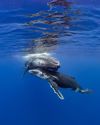Prøve GULL - Gratis
The Karakoram Anomaly Decoded
ASIAN Geographic
|AG 162
For decades, scientists have believed that glaciers in the Karakoram Range are defying the trend of those across the globe-resisting glacial melt due to human-induced global warming. But as we trek up the Karakoram's second-longest glacier in July, as the United Nations announces the world's hottest ever month on record, does the melting ice beneath our feet suggest the so-called Karakoram Anomaly is slowing? Or is there a ray of hope it will continue to delay the inevitable?

It is midsummer in Pakistan’s northern region of Gilgit-Baltistan, on the treacherous and unforgiving Baltoro Glacier, the second longest in the Karakoram Range and one of the largest outside the polar regions. We are trekking our way to the amphitheatre of Concordia, the confluence of the Baltoro, Godwin-Austen, Gasherbrum and Vigne Glaciers. Otherwise known as the “Throne Room of the Gods”, this is an otherworldly place flanked by the greatest concentration of the world’s highest peaks, including the second highest, K2. At an altitude of almost 5,000 metres, it’s hot – really hot. “I’m no expert, but the glacier looks like it’s dying,” proclaims Martin Mazurek, a fellow expedition group member and Professor of Geology at the University of Bern in Switzerland.

THE DEATH OF A GLACIER
Sadly, dying glaciers are fast becoming part of the tragic tale that is human-induced climate change. In August 2019, around 100 people scrambled up a mountain to mourn the death of Iceland’s Okjökull glacier – otherwise known as OK. Broken-hearted Icelandic glaciologist Oddur Sigurdsson produced a death certificate and announced that the glacier was no longer OK at all. The principal cause of the glacier’s demise: “excessive heat” and “humans”, he said. This tragic tale is indeed one of great loss. Biodiversity fading, extinction of species, sea levels rising and habitats shrinking – all are happening so subtly that the reality is difficult to grasp. But when you are on the glacier itself, the evidence is staring you right in the face. Yet, just because we can see the glacier melting under our feet, does this mean it is actually dying?
Denne historien er fra AG 162-utgaven av ASIAN Geographic.
Abonner på Magzter GOLD for å få tilgang til tusenvis av kuraterte premiumhistorier og over 9000 magasiner og aviser.
Allerede abonnent? Logg på
FLERE HISTORIER FRA ASIAN Geographic

ASIAN Geographic
Cerulean Colossus
A little introduction to the world's biggest fish
6 mins
AG 169

ASIAN Geographic
Tales from the Black Sea
A glimpse of hope
7 mins
AG 169

ASIAN Geographic
The Magnificent Seven
There are seven marine turtle species worldwide, three of which are listed as “Endangered” or “Critically Endangered”. Each have their own habitats, needs and peculiarities, but how much longer will we be able to enjoy their presence on our planet?
4 mins
AG 169
ASIAN Geographic
Ocean Giants
Understanding the enigmatic mantas and other mobula rays
9 mins
AG 169

ASIAN Geographic
10 Top Diving Experiences in the Philippines
The Philippines is renowned worldwide for its breathtaking marine biodiversity, crystal-clear waters, and vibrant coral reefs. Boasting over 7,000 islands, the archipelago offers countless diving spots that cater to beginners and seasoned divers alike. Whether you're seeking thrilling encounters with sharks, exploring world-class wrecks, or immersing yourself in colourful coral gardens, the Philippines has something extraordinary to offer. Here are 10 of the best diving experiences you should add to your bucket list.
1 min
AG 169

ASIAN Geographic
Introducing Hippocampus Unravelling the Seahorse
Seahorses are an elusive species that turn divers giddy with excitement. But what is it about them that fascinates people so much? Quite often, throughout my work and travels, I hear divers say, \"I don't like sharks – they're scary\" or \"Nudibranchs are boring\", but can you ever recall a time when you've heard a diver say that they don't like seahorses? I mean, what is there not to like about this mythical little creature?
3 mins
AG 169

ASIAN Geographic
Go for the Glow
The science behind coral colours
2 mins
AG 169

ASIAN Geographic
Revealed Silver
Known in Latin as argentum, originating from the Sanskrit word argunas meaning \"shining\", silver is often an overlooked metal in comparison to gold, though it has properties that make it a unique and special element.
2 mins
AG 166

ASIAN Geographic
Celebrating the 2023 Rolex Awards for Enterprise Laureate: Liu Shaochuang
As a part of the Perpetual Planet Initiative, the Rolex Awards for Enterprise continues to expand the initiative’s growing portfolio, supporting exceptional individuals with innovative projects in areas such as the environment, science and health, applied technology, cultural heritage, and exploration.
2 mins
AG 166

ASIAN Geographic
The Treasures of Tahiti and the Journey of Giants
For decades, French Polynesia's beguiling islands have adorned travel brochures, alluring honeymooners with turquoise lagoons, overwater bungalows, and lush volcanic peaks. Some 7,000 kilometres from its closest neighbours, and spread over five main island groups, the French territory's real treasures are not just what you see in the splashy brochures. Get ready for untamed, wild, ocean encounters.
6 mins
AG 166
Translate
Change font size
